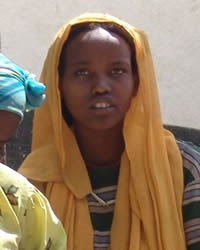Oromo, Tulema / Selale in Ethiopia

Photo Source:
CharlesFred - Flickr
Creative Commons
|
Send Joshua Project a map of this people group.
|
| People Name: | Oromo, Tulema / Selale |
| Country: | Ethiopia |
| 10/40 Window: | Yes |
| Population: | 10,043,000 |
| World Population: | 10,096,000 |
| Primary Language: | Oromo, West Central |
| Primary Religion: | Christianity |
| Christian Adherents: | 85.00 % |
| Evangelicals: | 15.00 % |
| Scripture: | Complete Bible |
| Ministry Resources: | Yes |
| Jesus Film: | Yes |
| Audio Recordings: | Yes |
| People Cluster: | Oromo |
| Affinity Bloc: | Horn of Africa Peoples |
| Progress Level: |
|
Introduction / History
The various Oromo people groups are the largest, most widely dispersed groups in Ethiopia. They also reside in Kenya, Somalia and Egypt. Composed of approximately a dozen tribal clusters, these peoples prefer just the term "Oromo" when speaking of themselves. Nearly all of these peoples speak mutually intelligible dialects of a language called "Borana-Arsi-Guji Oromo." Although they retain similarities in their descent system, they differ considerably in religion, lifestyle and political organization.
Most likely, the Oromos were pushed westward from the Horn of Africa by the Somali during the tenth century. Together with the Amhara and the Tigrai, they dominated the government and military classes of the Ethiopian Empire. In the 1700s and 1800s, these peoples became a prominent force in Abyssinian (Ethiopian) politics. During the nineteenth century, some subgroups converted to Islam. That did not include the Tulema / Selale Oromo who are Christian and have a strong church.
What Are Their Lives Like?
In today's world, the Oromo are known for their popular music. There are many videos on YouTube where you can hear it. Some are professional musicians.
The Oromo are herdsmen with a warrior tradition. They determine a man's status by the number of livestock he owns. Virility and male attributes are considered desirable, with bravery and war skills being stressed. Riding, spear-throwing, and fighting are also emphasized. Oromo boys are taught to use a spear and begin training at an early age to become warriors. The killing of a man was customarily a part of becoming a full-fledged adult, as well as part of certain festivals. Although they honor warfare against enemies, they demand peace within their own communities.
One basic value of the Oromo is tokuma, which is identification with the group. The religious, social, political and economic life of the Oromo revolves around this. Cooperation is central to this system, especially in work arrangements.
The Tulema Oromo live in rural areas where they make a living primarily from raising animals along with some farming. The typical dwelling is a tukal, or a circular hut made of acacia branches covered with grass mats. The cone-shaped roof has an opening that allows smoke to escape. Villages are made up of 10-80 families. Their staple diet includes durra (a cereal grain), maize, beans, rice, milk, meat and wild fruits. Coffee and tea are both popular beverages.
The Tulema Oromo family is headed by an authoritarian father who has the right to expect total obedience. Men usually have only one wife, and children are considered a necessity. The more children and grandchildren a man has, the greater his prestige.
Some Oromo have moved to the towns, attracted by employment opportunities and modern schooling. Others have entered national security forces, the industrial labor force, or fields of trade, transportation and education.
What Are Their Beliefs?
Unlike most Oromo subgroups, the majority of the Tulema Oromo are Christian. They have a strong church, and God can use them to reach the other Oromo groups that remain Muslim or animistic.
However, some remain committed to their traditional beliefs in a supreme being named Waqa. They hold feasts and sacrifice livestock in Waqa's honor. Some also believe that spirits inhabit trees, springs and rocks.
What Are Their Needs?
Tulema Oromo villages often have no electricity. Medical care is poor, and access to medicine is limited. Their water supply comes from rivers and springs.
Prayer Points
Pray that Tulema Oromo people will take up the challenge of discipling those who are not experiencing the abundant life that only Jesus offers.
Ask God to anoint the gospel as it goes forth via radio to the Tulema Oromo people.
Pray that God will give the Oromo believers boldness to share Christ with their own people.